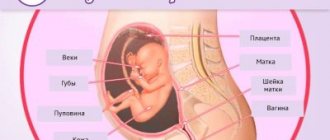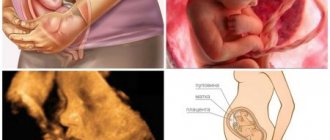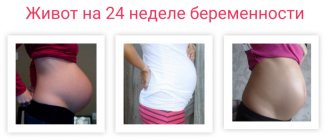The birth of a child is an important, responsible and happy moment in the life of every woman. Most of these manipulations occur on the 37-42 week line. During this period, the baby is already quite developed and ready to enter a new life. At the birth of a child, neonatologists must evaluate his condition. For this purpose, a certain scale is provided - Apgar. It involves a summary analysis of five criteria, each of which is assessed in points from zero to two inclusive. Normally, healthy children have from 8 to 10 points. The last figure is heard much less frequently. However, things don’t always happen the way we would like.
There are also cases when a woman begins labor at 32-33 weeks. It is this condition that will be discussed further. The article will tell you what are the warning signs of labor at 33 weeks of pregnancy. You will learn what to do in this or that case. Also find out what consequences the appearance of a baby at this time may have.
Childbirth at 33 weeks of pregnancy
The birth of a child at 7-8 months is considered premature. Labor at 33 weeks of pregnancy may be imminent or in progress. In the first situation, doctors make every effort to maintain the pregnancy. For these purposes, the expectant mother is prescribed bed rest, as well as the use of certain medications. Among them there must be sedatives (sedatives), medications aimed at relaxing the muscles of the uterus. In addition, doctors can prescribe additional compounds that improve blood circulation and promote the flow of oxygen to the fetus.
If labor cannot be stopped at 33 weeks of pregnancy, it is considered to have begun. In such cases, doctors choose the most convenient and safe delivery tactics. This may be a natural process or a caesarean section. It all depends on the condition of the fetus and the health of the expectant mother.
Risks around weight
If the baby is born in the 33rd week of pregnancy, its weight is usually around 1.5–3 kg. Infants weighing less than 2–2.5 kg require extensive measures to keep them alive until they reach the specified weight. Weight is an indicator of the presence of fat in the baby's body, which is necessary to maintain a safe body temperature outside the womb. Radiators, incubators, and electric beds can be used to keep the baby warm. Once the child has gained enough weight, they can be removed.
Causes of premature birth
Childbirth at 33 weeks of pregnancy can begin due to the influence of external factors, as well as due to internal pathological processes. Often the social status and lifestyle of the expectant mother lead to the situation described. The reasons that premature labor began at 33 weeks of pregnancy are the following situations:
- consumption of alcohol and drugs, use of certain medications in early and late stages;
- excessive physical activity, sexual intercourse;
- hormonal abnormalities, diseases of the reproductive organs;
- congenital defects of the uterus and its cervix;
- isthmic-cervical insufficiency or premature opening of the birth canal;
- infections of the pelvis and urethra, chronic heart and kidney diseases;
- incorrect location of the placenta and its detachment;
- injury and the presence of tumors in the uterus.
In fact, there can be many reasons for this unexpected process. Each individual case has its own factors. It is worth noting that if childbirth occurs at 33 weeks, then it is imperative to find out its cause. This will help you choose further tactics of behavior with the new mother and her baby. Also, eliminating the detected factors will ensure that the situation does not recur in the future.
In the hospital
- Many people tend to overlook the fact that a premature baby goes through a lot of trauma and distress as it tries to stay alive. By adopting this mindset, you can be confident that you will stop worrying about what happened and try to provide as much care as possible for your child, addressing any problems that arise.
- Keeping the child under supervision until he can live without any support is absolutely necessary. Any abnormalities should be brought to the attention of your doctor immediately.
- Since your baby can't feed right away, it's important that your body is ready to feed him as soon as he can. This requires regular pumping of the breasts to store milk and maintain the thought process of imagining your baby at the breast, which maintains milk production.
- Spending time with your baby is as important for you as it is for him. He can listen to you very well and sense his surroundings. Keep talking to him or singing to him so that he knows you are there and feels safe. If it can be held, emphasize skin-to-skin contact as much as possible to reassure your baby that everything is okay.
Discharge of amniotic fluid
Childbirth at 33 weeks of pregnancy may begin with the rupture of amniotic fluid. It is worth noting that this factor is often considered not very favorable. After all, keeping a child in the mother's womb without water for more than six hours leads to unpleasant consequences. That is why doctors often choose the tactics of caesarean section in case of premature rupture of water.
The discharge of amniotic fluid usually occurs abruptly. The woman simply feels warm water flowing down her legs. It is worth noting that sometimes this is preceded by physical activity. Also, premature rupture of the membranes can occur due to infection. Particular attention should be paid to the color of the amniotic fluid. A greenish tint indicates the suffering of the fetus. This only makes the situation even worse. If the waters are clear and clean, then the chances of a favorable outcome increase.
At home
- Limit the number of people who interact with the child while the child has had time to recover.
- If anyone is sick or showing signs of illness, keep them away from the baby as their immune system is still developing.
- When handling your child, make sure your hands are clean and sanitized. Make sure other family members take the same precautions.
- Keep a box of tissues for children and other children to maintain a hygienic atmosphere. Sterilize any toys your child plays with.
- Do not smoke in close proximity to your child.
Painful sensations
What are the signs of preterm labor at 33 weeks? First of all, a woman feels pain. It may have different localization. Most often, unpleasant sensations spread in the lower abdomen and lumbar region. However, there are exceptions. When the pain is periodic and cramping, these can be productive or unproductive contractions. In the first case, the woman will most likely give birth on her own. During unproductive contractions, the pain only exhausts the expectant mother without bringing any result. In such situations, doctors may use medications to stimulate the opening of the cervical canal.
When painful sensations cover the entire abdomen, and a woman feels weak, we can talk about placental abruption. This is an extremely unpleasant situation that often accompanies childbirth at 33 weeks of pregnancy. Reviews from doctors say that in this case, any delay could cost the life of the mother and her baby. This is why the maternity ward staff performs an emergency caesarean section.
Prolapse of the abdomen and removal of the plug
Harbingers that labor will begin at 32-33 weeks of pregnancy may be the separation of the mucous plug, which is often accompanied by prolapse of the abdomen. This process usually occurs two weeks before the onset of labor. Therefore, if you notice the described signs, you should consult a doctor as soon as possible. There is a good chance that your pregnancy can be maintained for a few more weeks.
The discharge of the mucus plug can be one-time or gradual. So, the total volume of mucus is approximately two tablespoons. A drooping belly can be noticed by your appearance. Also, the expectant mother will definitely notice that it has become easier for her to breathe. The gynecologist will find that the height of the uterine fundus has become smaller.
Risks around feeding
In order for your baby to gain weight as quickly as possible, feeding is the most important thing to do. However, babies born before 34 weeks of pregnancy may not breastfeed as effectively as they should. This also leads to the elimination of oral feeding, since the inability to suck affects the digestion process, and feeding from the mouth can lead to stomach upset, which can lead to further complications. In such cases, a feeding tube is the only way to provide the baby with the nutrients he needs. This tube goes directly into the baby's abdomen or may even be an intravenous tube.
Bloody discharge
Premature birth at 33 weeks is often accompanied by bleeding. It is worth noting that they can be abundant or meager. In the first case we are talking about pathology. Often this can be a rupture of the uterus, detachment of a child's place or other unpleasant situations.
With scanty bleeding, we are most likely talking about damage to the uterine mucosa. This is not as scary as the situations described above. However, medical care for a woman in labor is also necessary.
Childbirth at 33 weeks: consequences for mother
How dangerous is the current situation for the woman? At this stage, the expectant mother’s body has not yet prepared for the birth of the baby. The birth of a child comes as a surprise to the mother and all her organs. In this case, the uterine cervix may behave differently.
If the cervical canal opens as expected, then for the woman the birth will take place in the same way as it would have happened at term. In the case when the cervix is not yet ready (as often happens during the first birth), doctors are forced to perform stimulation. However, this manipulation does not always have an effect. Sometimes doctors are forced to perform surgery. This leads to the fact that the new mother is left with a scar on the uterus and abdomen, and the recovery process takes a lot of time.
Childbirth at 33 weeks of pregnancy often has complications. Reviews from doctors report situations when there is weakness in labor or, on the contrary, a rapid process.
When should you consult a doctor?
As already mentioned, every woman should regularly visit a gynecologist for a preventive examination, even when nothing hurts. You should definitely consult a doctor if your health suddenly worsens. Dizziness, fainting, weakness, bloody discharge from the genitals, as well as severe pulling in the stomach and back may appear. A cause for alarm is also the abundant discharge of mucus from the vagina, even if it is transparent and does not bother you at all.
Feeling unwell, fever, rapid heartbeat, surges in blood pressure, cramping pain, sleep disturbances are symptoms of an inflammatory process in the internal organs. You cannot risk your own health and the life of your baby. An immediate visit to a specialist will help identify the cause and get rid of the problem in time. Refusal of hospitalization and emergency childbirth for medical reasons is a huge mistake, the cost of which is high. Artificially induced labor often becomes the only correct way out of the situation.
In this article
- What causes a baby to be born at 33 weeks?
- Risks associated with babies born at 33 weeks
- How to care for a primi born at 33 weeks?
- What is the survival rate for babies born at 33 weeks?
- How long does a baby born at 33 weeks stay in the NICU?
Any baby born before the completion of at least 37 weeks of pregnancy is usually called a premature baby. The baby's development is not yet complete during the entire 40-week cycle. Therefore, it is necessary to take extra precautions and measures to ensure the safety and health of the child.
Twins born at 33 weeks
Often, multiple pregnancies end earlier than normal ones. Almost never does an expectant mother manage to carry her babies to 40 weeks. Doctors talk about excellent results when babies appear at 36 weeks. A good outcome is also expected for delivery at 34 weeks.
During a multiple pregnancy, after 30 weeks, a woman is given certain medications that promote the rapid development of lungs in babies. That is why childbirth at 33-34 weeks of pregnancy leads to the fact that the children can already breathe on their own. Nevertheless, their body is still very vulnerable and requires certain conditions.
Fetus
The fetus at 32 weeks of gestation grows up to 43 cm and weighs 1700-1800 g, and sometimes even more. The phase of active growth of the baby continues - a woman owes almost all of her weight gain during pregnancy to an increase in the weight of the fetus.
All systems and organs of the baby are fully functioning: the nervous system is functioning; the work of the endocrine glands (pituitary gland, thyroid and pancreas, adrenal glands, etc.) participating in metabolism is improved; The immune system “turned on”, producing antibodies to protect the baby in the first time after birth.
The baby also changes in appearance: the skin becomes more and more smooth and takes on a light pink tint, the arms and legs are rounded, and cheeks are also formed. Lanugo - the original down - gradually disappears, the hair on the baby’s head becomes thicker, although it retains its softness and remains sparse.
The fetus at 32 weeks of gestation usually already occupies the position from which its journey to the new world will begin, usually this is a cephalic presentation. And, although the baby’s bone tissue is still improving, the baby’s bones continue to strengthen, the skull still remains soft - this is necessary to facilitate the passage of the baby through the birth canal.
Consequences for the child during premature birth
How can childbirth at 33-34 weeks of pregnancy end for a child? At this stage of development, every day or even hour spent in the womb is important for the baby. This is why doctors try so hard to keep a woman pregnant, even for a few days.
If the expectant mother goes to the maternity ward on time, the specialists will have time to administer certain medications to her before giving birth. They will be aimed at maintaining the independent functioning of the child’s organs. The appearance of the baby at 6 months, as well as the birth at 33 weeks, reviews are quite favorable. Approximately 90 percent of babies born at this stage of development not only survive, they can breathe on their own. Some children still require intensive therapy. Many of them continue to be fed through a tube for some time.
Thermoregulation of premature babies has not yet been established. Any hypothermia or overheating can lead to unpleasant consequences. That is why it is so important to provide timely help to the baby. Doctors place the babies in special incubators. There, all conditions are provided for children: the required temperature is maintained, they have the opportunity to receive food and the necessary medications. In the absence of congenital pathologies, children can be next to their mother in 2-4 weeks.
Often premature babies are deprived of natural nutrition. While the babies are under medical supervision, the mother simply loses her breast milk. To prevent this from happening, you should contact a lactation consultant immediately after giving birth. A specialist will tell you when and how to express milk correctly, so that later you will be able to feed your baby on your own. After all, it is this food that will allow the crumbs to quickly adapt to the environment.
Separately, it is worth mentioning the premature birth of boys. If your son was born at 33 weeks, his testicles most likely have not yet descended into the scrotum. There is nothing terrifying about this. There is no need to create panic. Usually, within a month or two after proper care, the baby’s reproductive organs take their usual position. However, there are exceptions. Be sure to consult a surgeon so that the doctor can take your situation under his own control. If necessary, surgery may be necessary after some time.
Risks around infections
Just like the brain, another system that takes time inside the uterus to function at optimal levels outside is the immune system. The baby gets a boost of antibodies in the later stages of pregnancy, allowing it to survive the initial wave of bacteria and infections that may come its way. Premature delivery accompanied by ongoing procedures to support the baby can significantly increase the risk of infection and further complications.
Home birth: medical opinions
Many women have recently preferred to give birth at home. Such representatives of the fairer sex believe that their native walls facilitate this process. Expectant mothers order individual midwives or do everything themselves.
Most experts are ardent opponents of such a scheme. They argue that the delivery process should take place exclusively in specialized institutions. If we talk about premature birth, then doctors even call such an action infanticide. After all, not all babies at this stage of development can survive on their own. Many children require urgent medical attention. Otherwise, the baby may simply die. Yes, and mommy needs to be examined by a qualified doctor.










